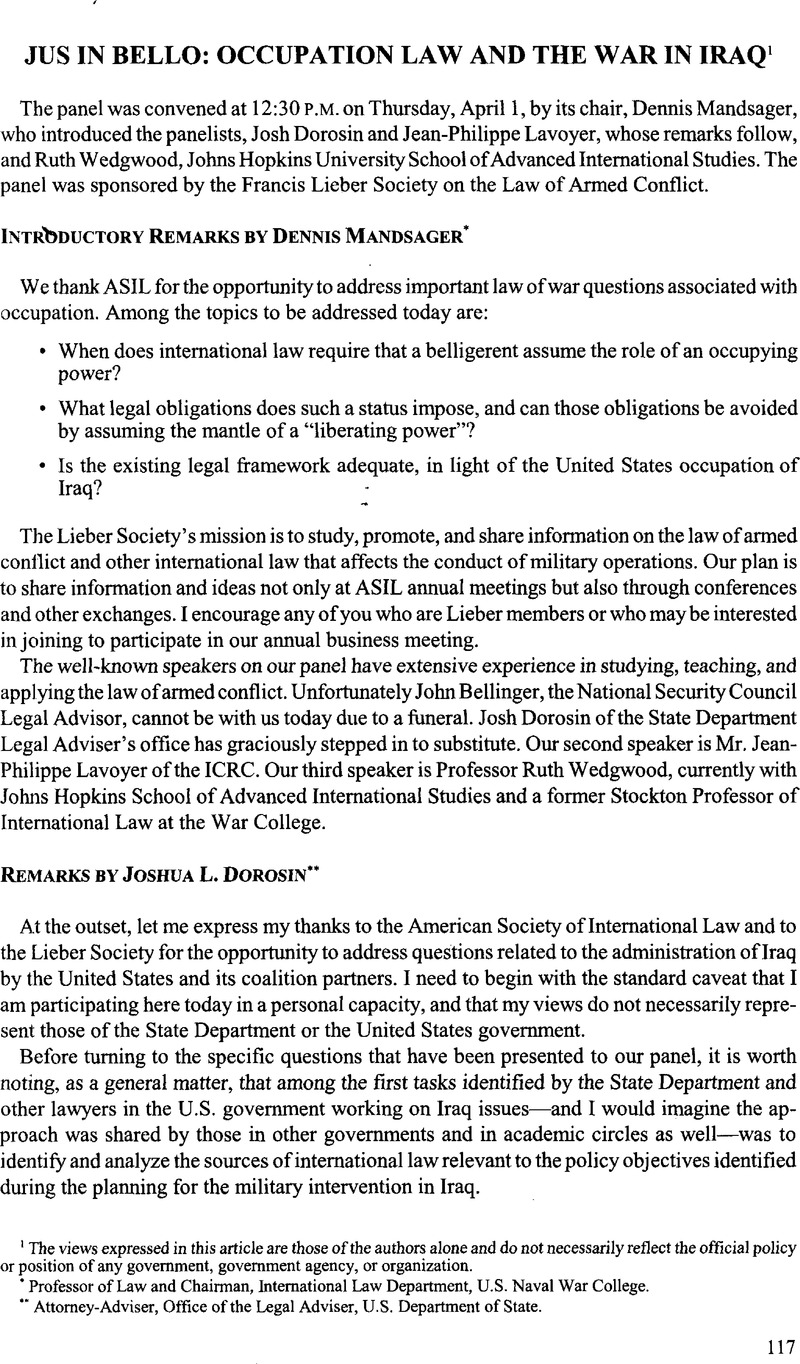No CrossRef data available.
Article contents
Remarks by Joshua L. Dorosin
Published online by Cambridge University Press: 28 February 2017
Abstract

- Type
- Jus in Bello: Occupation Law and the War in Iraq
- Information
- Copyright
- Copyright © American Society of International Law 2004
References
1 Hague Convention IV Respecting the Laws and Customs of War on Land, signed Oct. 18,1907, Annex, Article 42, 36 Stat. 2277.
2 See, e.g., Roberts, Adam, What is Military Occupation?, 50 Brit. Y. B. Int’l L. 249, 256 (1984)Google Scholar; U.S. Department of the Army, The Law of Land Warfare, Field Manual 27-10, 139 (July 18, 1956). According to one leading commentator,
Territory is considered occupied when it is actually placed under the authority of the hostile army .... Thus there is assumed an invasion of the enemy state, resisted or unresisted, as a result of which the invader has rendered the enemy government incapable of publicly exercising its authority; the invader has successfully substituted its own authority for that of the legitimate government in the territory invaded.
Gerhard Von Glahn, The Occupation of Enemy Territory 28 (1957).
3 Hague Regulations, supra note 2.
4 Geneva Convention Relative to the Protection of Civilian Persons in Time of War of August 12, 1949, 6 U.S.T. 3516.
5 See, e.g., SC Res. 1031(1996).
6 See SC Res. 1244(1999).
7 See SC Res. 1272(1999).
8 UN Charter art 103; Article 103 specifically provides that “[i]n the event of a conflict between the obligations of Members of the United Nations under the present Charter and their obligations under any other international agreement, their obligations under the present Charter shall prevail.”
9 See, e.g., SC Res. 661 (1990); SC Res. 678 (1990); SC Res. 687 (1991); SC Res. 986 (1995); and SC Res. 1284 (1999).
10 See Hague Regulations, supra note 2, Arts. 53 and 55. For discussions of the contours of an occupying power’s authority to use oil resources and their proceeds, see Territories Occupied by Israel: Settlements and Exploration of Oils Resources, 72 ASIL Proc. 118 (1978); United States: Department of State Memorandum on Israel’s Right to Develop Mew Oil Fields in Sinai and the Gulf of Suez, 16 ILM 733 (1977); Cummings, Edward R., Oil Resources in Occupied Arab Territories Under the Law of Belligerent Occupation, 9 J. Int’l L. & Econ. 533 (1974)Google Scholar.
11 See, e.g., SC Res. 661 (1990) and SC Res. 986(1995). Resolution 661 imposed comprehensive sanctions on Iraq after that country invaded Kuwait, including prohibitions on the export of Iraqi oil. In 1995, acting under Chapter VII of the UN Charter, the Security Council established the “Oil for Food” program in Resolution 986, allowing Iraq to sell limited amounts of oil under UN oversight for the limited purpose of financing the purchase of humanitarian goods and other UN-mandated activities.
12 SC Res. 1483 (2003), para. 9.
13 Ibid., paras. 10-22.
14 See, e.g., Commentary, IV Geneva Convention Relative to the Protection of Civilian Persons in Time of War 273-74 (Jean Pictet ed.). In interpreting Article 47 of the 4th Geneva Convention, Pictet says that
During the Second World War occupying powers intervened in the occupied countries on numerous occasions and in a great variety of ways, depending on the political aim pursued; examples are changes in constitutional forms or in the form of government, the establishment of new military or political organizations, the dissolution of the State, or the formation of new political entities. International law prohibits such actions, which are based solely on the military strength of the Occupying Power and not on a sovereign decision by the occupied State ... Such practices were incompatible with the traditional concept of occupation (as defined in Article 43 of the Hague Regulations of 1907) according to which the occupying authority was to be considered as merely being a de facto administrator.
Id. at 273.
15 SC Res. 1483, supra note 13, at para. 4.
16 Ibid, at para 8.
17 Ibid, at para 9.
18 SC Res. 1511 (2003), para. 7. Resolution 1511 also recognizes the Governing Council and its minister as the principal bodies of the Iraqi interim administration, which “embod[y] the sovereignty of the State of Iraq” during the transitional period. Ibid., at para. 4.




